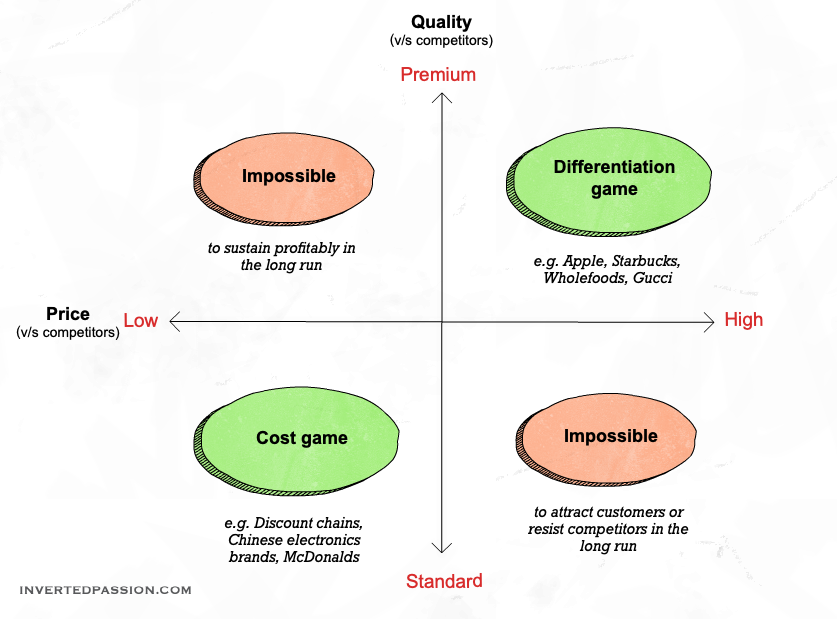Proven physical theories are called laws because they dictate how our world operates. If there were such a “law” of capitalism, it would probably be the fact that profits attract competitors who try to eliminate it by offering customers either a lower price or a higher quality. This law thus allows for only two types of businesses to exist: cost-focused business or quality-focused business. Think of a McDonald’s v/s your neighborhood gourmet burger restaurant. Any business that tries to be both doesn’t work out in the long run.

Cost-focused businesses are those who compete on the basis of giving a lower-priced product than their competitors. Because they offer products at low prices, their profit margins are typically razor-thin but they make up for it by selling at high volumes. To remain profitable, cost-focused businesses work relentlessly to keep lowering their expenses via operational efficiency and pass the majority of cost savings back to customers in the form of low prices. A new competitor typically isn’t able to offer similar products at a lower price because they’re not able to match the enormous operational efficiency that’s required to do so.
An example of cost focused-business is Walmart whose “everyday low prices” promise is made possible only because they’ve invested over the decades in squeezing efficiency out of their operations, procurement, logistics, discounting, and warehousing. They do not promise the highest quality product or experience because they know it’s impossible to do so at the price they offer products to their customers. But their customers are okay with this because they care about cheap prices more than anything else. For them, Walmart is much better than any other retailer.
Quality-focused businesses, on the other hand, compete by offering a highly differentiated product or service to their customers. They focus on keeping the quality of the product higher than other competitors so that it stands apart in the market. Trying to differentiate the product from competitors requires paying highly for premium talent or ingredients and because competitors are always trying to catch up, it also requires a never ending flow of investment into R&D. That’s why quality-focused businesses can’t afford to offer a low price. They resist competitors by building highly differentiated products which are expensive or difficult to copy.
An example of such a business would be Apple who has historically focused on design and innovation to stand apart from other computer and phone manufacturers. Their products are expensive because their philosophy seems to be high quality at all costs.
Amazon’s eCommerce business is a cost-focused business working on razor-thin profit margins. Bezos famously said “Your margin is my opportunity”. This shows that he believes Amazon is focused on winning customers by delivering the lowest possible price to the customer for commodity products. However, their other business, Amazon Web Services, is focused on building a highly differentiated cloud computing platform, and therefore it enjoys a double-digit profit margin for Amazon.
Strategy is actually a combination of what you decide to do and what you decide not to do. In fact, deciding what not to do is perhaps more important than deciding what to do because it creates clear boundaries around your business model. If you lack this clarity on what you’re not, it’s easy to fall into wishful thinking and start believing that your business can do whatever it wants. That’s not true. Fundamentally, you have to let other businesses win most battles as you can only pick a few battles to win them with all your might.
Remember: you can either be cost-focused or quality-focused. Don’t try to be both. It doesn’t work.
This essay is part of my book on mental models for startup founders.
Join 200k followers
Follow @paraschopra